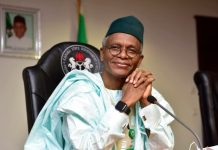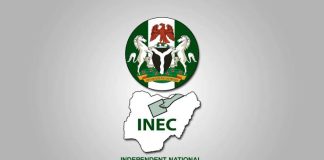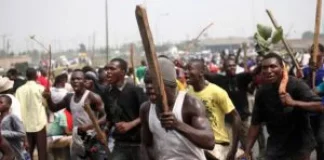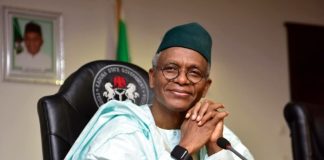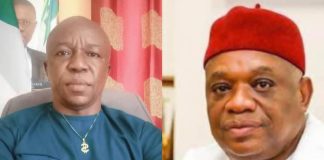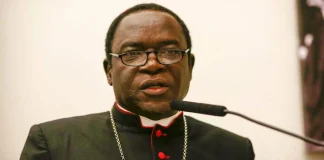🌿 Ruzu Non-Alcoholic Herbal Bitters
Ruzu Non-Alcoholic Herbal Bitters is a natural health supplement specially formulated to:
- ✅ Promote general wellness
- ✅ Detoxify the body
- ✅ Support the treatment of various ailments
Made from a powerful blend of 100% organic and medicinal herbs, Ruzu is completely alcohol-free, making it ideal for:
- 👪 All age groups
- 🌱 Health-conscious individuals
- 🌿 Anyone seeking non-alcoholic herbal remedies
Whether you're looking to boost your vitality, cleanse your system, or support healing the natural way, Ruzu Bitters offers a trusted herbal solution.
From traumatic memories journalists recounted how they suffered life threatening travails in the course of their duties from Nigerian authorities. They label the country as one of the unsafe environments to practise journalism. Amidst all odds, journalists stand firm to discharge their watchdog responsibilities.
During the 2023 Kogi senatorial elections, Oche Akor, a freelance journalist, was busy covering the senatorial polls in Kogi State when he was attacked by some political hoodlums. His offence? He was taking pictures and voice recordings of the electoral processes.
Surprisingly, some police officers joined the attack, abducting the journalist and transporting him to different locations. They eventually handed him over back to the hoodlums who threatened to kill and throw him inside a river.
“That was not the first time I was under attack. But this time, I was mobbed, my phone was collected and spoilt immediately. It was a traumatic experience I don’t like to recall,” Mr Akor said in a sober tone.
“They took me to another location which I did not know. Suddenly, I was thrown out of their moving vehicle, and the policemen warned me to leave the state immediately.”
Since there was no movement of commercial transportation on the election day, Mr Akor was left with no option than to get a bike man who conveyed him to a different city at an exorbitant cost. “People were after me. And to be honest, I really don’t like talking about it because I have been traumatised and scared since that time.”
Meanwhile, Mr Okor is not alone. Nigeria’s awful relationship with journalists is unsurprising. According to Space for Change, most problems with the press in West Africa happened in Nigeria. There have been 122 cases of press and media attacks there.
According to data from the Committee Protecting Journalists (CPJ), Nigeria is no longer alien to the stampeding of journalists, with at least 24 journalists reportedly killed between 1992 and 2022.
Lurking Behind Cybercrime Law
Daniel Ojukwu, a reporter with the Foundation for Investigative Journalism (FIJ) was abducted In May by the Intelligence Response Team (IRT) of the Inspector General of Police. He was initially detained in the State Criminal Investigation Department (SCID), Panti, Lagos State and later moved to the Threat Response Unit of NPF National Cybercrime Centre, Abuja.
He was alleged to have contravened the 2015 Cybercrime Act, following a publication of his investigative story that exposed involvement of some government officials in corrupt practices.
His bail was secured after spending nine days in detention, following a protest in the country’s capital.
The FIJ journalist told this reporter that his daily activities suffered a pause; as he was prevented from discharging his duty because he could not have access to his device and normal daily routine throughout his detention at the police custody.
“I lost a lot, honestly. On the day I was abducted, I was pursuing a lead. I never got to finish that story due to the incident. Other stories I had in the works were put on indefinite hold.
“Also, my personal ventures suffered. There were correspondences I was supposed to make via email, but I couldn’t do so. Similarly, my family and friends had to suspend their own lives to fight for my release. They lost money, sleep and opportunities.”
However, the threat strengthened Mr Ojukwu’s conviction to use the media as a tool for social change despite the physical and mental threat he underwent. He said: “The incident pushes me to engage more in conversations and efforts aimed at improving press freedom and strengthening our justice system.”
Before its assumption into office, the current administration of President Bola Tinubu promised to always uphold media freedom and respect opinions, whether they are adversarial or complimentary to his government.
However, between 2023 and 2024, from Saint Onitsha, a Bayelsa-based owner of Naija TV to Daniel Ojukwu, and down to others, right to freedom of expression and media freedom have been repeatedly violated. Lurking behind Cybercrime Laws, the security forces have threatened, arrested, and detained journalists.
Also, a recent report by the Press Attack Tracker under the Centre for Journalism and Innovative Developments (CJID) showed that 37 journalists have suffered an attack under the Tinubu regime between May 2023 to May 2024. The state actors and security personnel have the highest counts, recording seven and 26 respectively.
READ ALSO:Journalists regain freedom 7 days after abduction in Kaduna
Within this period, no fewer than 11 journalists were reported to have been held in custody in a Gestapo manner by the Nigerian authorities.
More Stories, More Travails
It was a fateful Friday, Jamil Ismaila Mabai, a reporter and correspondent of Trust TV, visited Katsina State Hisbah office to conducted an interview over an incident that claimed the life of a man when an operative of the Community Watch Corp fired a gunshot during a raid to enforce the ban of DJs’ activities in the state.
Without knowing that it was a setup, he was detained and locked up in a cell for an hour upon his arrival at the scene, as the Hisbah Public Relations Officer who gave him an appointment failed to show up.
“I informed them that detaining a journalist on their premises without reason or opportunity to provide a statement is a clear violation of press freedom.
But they confiscated my phone and held me in a cell.
“The entire ordeal raised serious concerns.”
Likewise, Mustapha Usman, a reporter for International Centre for Investigative Journalism (ICIR) is another journalist who suffered at the hands of FRSC (Federal Road Safety Corps) officials who attempted to illegally seize a car from a woman.
Mr Usman was coming from his office that day. He noticed two FRSC officers were battling a steering wheel with a woman, while others surrounded the car. “Unfortunately the officers later deflated the woman’s car tires,” he said.
“I was watching closely and I tried to video the event secretly because I’m sure that I would be subjected to abuse, if I had done it openly. And of course none of them knew I recorded the incident until later.”
“One of the officers chased people away, when the situation became tense. They tried to drag me but I made them realise that I’m a journalist. I showed them my ID card but they didn’t care. They started slapping me. About five of them mobbed me to the extent of not being able to recognise who exactly beat me.”
“I was trying to retrieve my ID card from the floor when another person hit me and took my ID card”, the victim disclosed.
Mr Usman believed that the officers knew that what they did to the woman was illegal, and they wanted no one to capture the incident, hence they molested him, with an aim to distort any evidence of their illegal actions.
Finally, Mr Usman sought the intervention of the officers’ Sector Director before he was able to recover his ID card.
Press Freedom and Human Rights Under Nigerian Constitution
Section 39 of the 1999 Nigerian Constitution grants to individuals, the freedom to hold opinions, thoughts and express themselves without interference from any person.
It reads: “Every person shall be entitled to freedom of expression, including freedom to hold opinions and to receive and impact ideas and information without interference”.
Although the constitution puts limits as to how a person can enjoy these fundamental rights. For example, it must not contravene other people’s rights. However, the same constitution also mandates the authorities to observe some due process whenever they are enforcing breaches of any constitutional provision against any person.
The scenarios being witnessed in Nigeria unfolded a different story, as many journalists were illegally arrested in Gestapo manners and held incommunicado for days without being charged to court. In most cases, the victims are finally granted bail.
Expert Weighs-in
A legal practitioner, Emmanuel Okorie, identified abuse of power by the state actors as the major reason behind journalists being subjected to abuse in Nigeria.
He argued that there are some laws in Nigeria that exist and work solely against journalists, in order to shut them up. He cited the 2015 Cybercrime Act as an example. “Most times when individuals try to expose corruption, the political actors usually activate the sections of the Cybercrime Act that deal with defamation to clamp them down.”
“They also know that even when they go to court, they won’t be able to prove the case against their victims. But what they do is that, they activate the law and write a petition to the police and the police will arrest such a person, claiming that he made a defamatory publication.”
Furthermore, Mr Okorie, who is also the Edo State Coordinator of Hope Behind Bars Africa, a nonprofit organisation advocating for prisons reformation and social justice, noted that the implication of the trends is to intimidate journalists from performing their duties
“Journalists will be afraid to do stories because they know that they might be brutalised, get arrested and sent to prison by people who do not want their secrets to be exposed .”
The human rights lawyer urged the victims of this menace not to be silent on the matter, saying that they should always approach the court to seek redress and bring their oppressors to justice, in order to hold them accountable for their malicious actions and prevent future occurrence.
By: Muheeb Mashood
The post Molested, abducted, detained: How authorities are waging war against journalists in Nigeria appeared first on Latest Nigeria News | Top Stories from Naomisophyblog.



